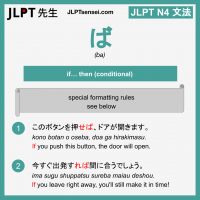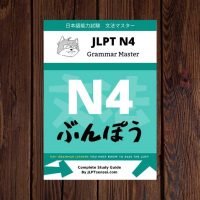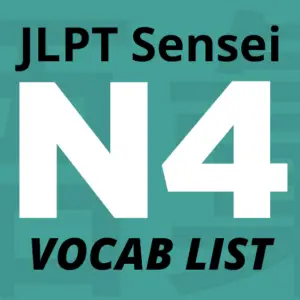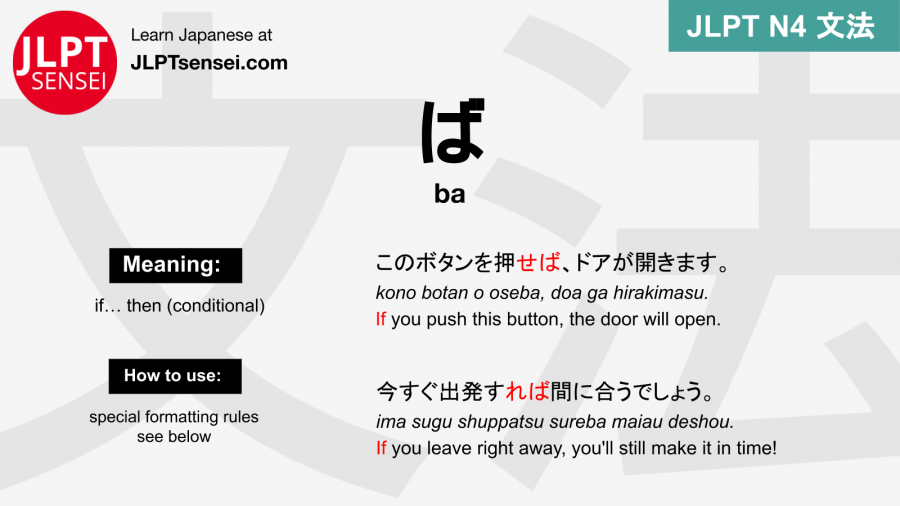Aprende gramática del idioma Japonés: ば (ba). Significado: conditional form; If [A] then [B].
Standard format: [A] ば [B]
If condition [A] is met, then [B] will happen.
Conditional rules for ば (ba)?
There are some special format rules for this grammar, which I will explain now with some examples before moving on to our main example sentences.
Verbs
- Use dictionary form.
- Change the ending from «u» to an «e».
- Add ば at the end.
う Verb – Example
行く = いく = iku = to go
ku changes to ke
行けば = いけば = ikeba = if (you) go
る Verb – Example
食べる = たべる = taberu = to eat
ru changes to re
食べれば = たべれば = tabereba = if (you) eat
Special Verb 来る
来る = くる = kuru = to come
ru changes to re
来れば = くれば = kureba = if (you) come
Special Verb する
する = suru = to do
ru changes to re
すれば = sureba = if (you) do
Verb (Negative Form)
- Use dictionary negative form.
- Change the ending い (i) to なければ (nakereba).
行かない = いかない = ikanai = to not go
changes to
行かなければ = いかなければ = ikanakereba = if (you) do not go
い-adjective
- Change the ending い ( i) to ければ (kereba).
大きい = おおきい = ookii = big
changes to
大きければ = 大きければ = ookikereba = if big
い-adjective (Negative)
- The rules are the same, change the ending い ( i) to ければ (kunakereba).
大きくない = おおきくない = ookikunai = not big
changes to
大きくなければ = おおきくなければ = ookikunakereba = if not big
な-adjective
- At the end, add either of the two.
- ならば (naraba)
- であれば (de areba)
便利 = べんり = benri = convenient
changes to
便利ならば = べんりならば = benri naraba = if convenient
(OR)
便利であれば = べんりであれば = benri deareba = if convenient
な-adjective (Negative)
- At the end, add either of the two.
- じゃなければ (janakereba) (more casual)
- でなければ (de nakereba)
便利 = べんり = benri = convenient
changes to
便利じゃなければ = べんりじゃなければ = benri janakereba = if not convenient
(OR)
便利でなければ = べんりでなければ = benri denakereba = if not convenient
Noun
- Same as な-adjective
- At the end, add either of the two.
- ならば (naraba)
- であれば (de areba)
日本人 = にほんじん = nihonjin = Japanese
changes to
日本人ならば = にほんじんならば = nihonjin naraba = if Japanese
(OR)
日本人であれば = にほんじんであれば = nihonjin deareba = if Japanese
Noun (Negative)
- Same as な-adjective (negative)
- At the end, add either of the two.
- じゃなければ (janakereba) (more casual)
- でなければ (de nakereba)
日本人 = にほんじん = nihonjin = Japanese
changes to
日本人じゃなければ = にほんじんじゃなければ = nihonjin janakereba = if not Japanese
(OR)
日本人でなければ = にほんじんでなければ = nihonjin denakereba = if not Japanese

Click the image to download the flashcard.
Download all N4 grammar flashcards.

Download our complete
JLPT N4 Grammar Master E-book.
Access ALL extra downloads, ebooks, and study guides by supporting JLPT Sensei on Patreon.
ば - Oraciones de ejemplos 例文
Cada oración de ejemplo incluye ayudas como la lectura (hiragana) en Japónes, la lectura en romaji, y la traducción en Español.
Da clic en el siguiente botón rojo para alternar todas las ayudas, o puedes dar clic en los botones individuales para mostrar únicamente las que desees ver.
Ejemplo #1
このボタンを押せば、ドアが開きます。
Ejemplo #2
あなたが行けば、わたしも行くよ。
Ejemplo #3
今すぐ出発すれば間に合うでしょう。
Ejemplo #4
毎日練習をすれば、上手になるよ。
Ejemplo #5
数週間もすれば、みんな忘れるよ。
Ejemplo #6
海に行けば誰だって水着を着るわ。
Ejemplo #7
アメリカ大使館へ行きたいんですが、どう行けばいいですか。
Vocabulario 語彙
| Kanji 漢字 |
Kana カナ |
English 英語 |
|---|---|---|
| 便利 | べんり | convenient |
| 押す | おす | to push; to press |
| 開く | ひらく | to open |
| 出発 | しゅっぱつ | to depart |
| 間に合う | まにあう | to make it in time |
| 毎日 | まいにち | everyday |
| 練習 | れんしゅう | practice |
| 上手 | じょうず | skilled |
| 数週間 | すうしゅうかん | a few weeks |
| 忘れる | わすれる | to forget |
| 海 | うみ | ocean |
| 誰だって | だれだって | everyone |
| 水着 | みずぎ | swim suit |
| 着る | きる | to wear |
| 大使館 | たいしかん | embassy; consulate |
Ver todas las lecciones de gramática del JLPT N4



